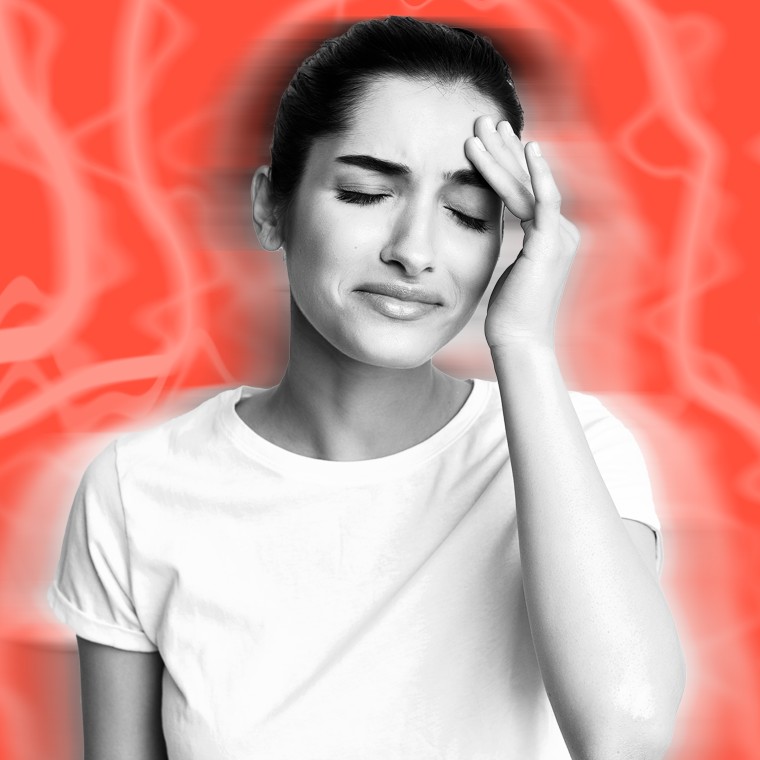Ever since the start of the pandemic, people have been reporting coronavirus symptoms involving unusual sensory experiences.
Some COVID-19 patients have noticed “tingling” all over the body or described feeling like their skin was “on fire” and “burning."
People have also taken to social media to complain of an “electric feeling” on their skin, a “buzz” in their body or "fizzing" in their veins.
Now a new study, published ahead of peer review in December 2021, is highlighting the experiences of 140 people with long COVID-19 who reported "internal tremors and vibration symptoms."
The idea for the paper originated with the harrowing experience of Heidi Ferrer, a television and film writer who "had severe manifestations of the sensations of vibrations," the authors wrote. She found the symptoms intolerable and died by suicide at 50 in May 2021.
Researchers at Yale School of Medicine and the University of Pennsylvania Perelman School of Medicine partnered with Survivor Corps, an online support group of 180,000 COVID-19 survivors, to collect the stories from people who reported such sensations.
Participants in the study described the symptoms this way:
- "Sometimes my entire body feels like it's humming and trembling. It's like I'm sitting on a huge speaker with the volume all the way up."
- "Internal vibrations started about 3 weeks after. They started in my back and back of upper thighs. It felt like I was sitting on a vibration massage chair."
- "I have felt internal tremors that feel like a fizzing/bubbling that moves through my trunk and extremities."
- "I buzz like a battery."
Some people said they experienced tremors that left them unable to hold a pen or a fork, work, carry out daily activities or go to sleep. The symptoms sometimes led to anxiety, depression and suicidal thoughts.
"As I've talked to people who are experiencing this, there are some who just find no peace. Their bodies are no longer under their control and these symptoms are creating a living hell for them," Dr. Harlan Krumholz, a cardiologist and scientist at Yale University who spearheaded the study, told TODAY.
"I've talked to maybe five or 10 people who have contemplated taking their lives because the symptoms are so severe."
Some people felt the vibrations or tremors more in the extremities; others more internally, he added. Almost all of the participants had undergone testing, but no one had been able to identify the underlying cause of the sensations. Many participants said their symptoms were "actively dismissed" as psychological, not physiologic, which is a "far too premature conclusion," Krumholz noted.
What's causing these symptoms?
Such sensations are not a common symptom of COVID-19 and are not listed as warning signs by the Centers for Disease Control and Prevention or the World Health Organization.
There was no definitive explanation for these reports when TODAY first reported them in 2020. It’s likely a patient’s immune response — rather than the virus itself — would cause such sensations, said Dr. Waleed Javaid, director of infection prevention and control at Mount Sinai Downtown in New York.
“There’s a widespread immune response that is happening. Our immune cells get activated so a lot of chemicals get released throughout our body and that can present or feel like there’s some fizzing,” Javaid told TODAY at the time.
“When our immune response is acting up, people can feel different sensations… I have heard of similar experiences in the past with other illnesses.”
As 2022 began, researchers were at a very early stage of understanding these tremors and vibrations, Krumholz said. Most people who become infected with the new coronavirus don't go on to have these kind of sensations, he added.
As for the cause, there are still no concrete answers but possible explanations include a residual infection that's "causing mischief" and somehow affecting the nervous system, Krumholz noted.
"The body's exuberant response to the virus has never stopped in some of these people and it's sort of essentially friendly fire," he said.
"There's something revved up in the body in response to this that's essentially hurting the body, and in this case, somehow it's affecting the nerves in a way that is felt in a very negative way by people."
The next step in the research is to organize larger studies to see whether these patients have certain immune signatures or evidence that they never really got rid of the infection so it's continuing to cause problems.
"We need to be able to find some ways to be able to test and monitor this," Krumholz said. "Right now these people, many of them, are being dismissed because our medical tools are seemingly inadequate to reflect what's actually causing it in them."
Neurological issues in general have been well documented during the pandemic. The new coronavirus can enter the brain easily through a person's nose, infiltrating brain cells and possibly leading to lasting neurological symptoms, research has found. It's already known that brain fog and other neurologic symptoms can last for months after COVID-19.



